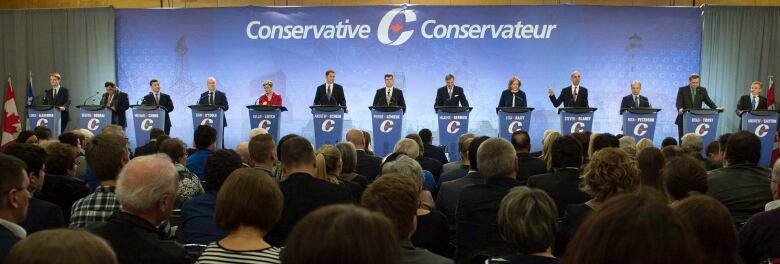Conservative drop-off deadline approaches — but does anyone want out?
Everyone says they are in it to win it, but someone will finish an ignominious 14th if no one bows out

If any of the 14 candidates running for the Conservative leadership are thinking of dropping out and keeping their name off the ballot, they will soon need to make up their minds.
But with a midnight deadline looming on Friday, it doesn't seem that anyone is throwing in the towel just yet.
The ballot that will be sent out on April 28 will give members the option of ranking up to 10 candidates. The party may have been hoping that the current list of 14 would have already been whittled down before the upcoming deadline.
- Tory rivals tout numbers as membership deadline passes
- O'Toole winning caucus as it shuns Bernier, O'Leary
There is no immediate incentive for any candidate to drop out of the race; all have already paid the requisite fees to the Conservative Party.
But all of the candidates who responded to inquiries from CBC News, and who have been struggling in the polls, say they're in it for the long haul.
The campaigns of Andrew Saxton, Pierre Lemieux and Brad Trost say they have no intention of bowing out.
"The thought has never once occurred to me," Chris Alexander said in an email.
"See you in Toronto on May 27th," wrote Rick Peterson, referring to the leadership event where the party will announce the winner.
Tony Clement and Daniel Lindsay, who both withdrew late last year, have been the only two candidates to drop from the race. Neither the campaigns of Steven Blaney nor Deepak Obhrai responded to inquiries about their intentions.
The bottom 7
In polling by Mainstreet Research for iPolitics of Conservative donors who say they are eligible to vote in the leadership race, Alexander, Blaney, Lemieux, Obhrai, Peterson, Saxton and Trost have all routinely polled at three per cent or less.
These seven candidates are also ranked in the bottom half of the Conservative Leadership Index, a compilation of a number of leadership metrics.
One metric that is not tracked in the index is social media presence. But data provided to CBC News by Twitter Canada suggests these seven candidates have also struggled to gain traction in this online sphere.

These seven have attracted the fewest new followers to their Twitter accounts, both since entering the race in 2016 and since the beginning of this year. Each has gained less than 1,500 new followers so far in 2017 — with candidates Blaney, Lemieux, Obhrai and Saxton all gaining less than 1,000.
By contrast, Kevin O'Leary has picked up 64,000 new followers, Maxime Bernier has gained 10,800 and Kellie Leitch has picked up 6,900. Lisa Raitt, Michael Chong, Andrew Scheer and Erin O'Toole have gained between 2,700 and 6,500 since the beginning of 2017.
Much of O'Leary's social media strength, however, is felt south of the border. According to Twitter Canada, just 26 per cent of all of his followers are Canadian.
Incentives to stay and to go
Every leadership candidate says they are in it to win it, but the chances for many of them — particularly those at the bottom of the league tables on any number of metrics — are very slim.
Nevertheless, there are legitimate reasons for these candidates to keep themselves in the spotlight — even if it is at the margins.
Saxton, Alexander and Lemieux all lost their seats in the last federal election and may want to mount a comeback in 2019.
Some of the candidates are staying for ideological reasons. Lemieux and Trost have positioned themselves as the standard bearers of social conservatives within the party.
While they have little chance of winning, their presence has given social conservatives a voice and has made them a voting bloc worth wooing — as several of the front-running camps are trying to do.
Blaney has been a fierce defender of supply management, challenging Bernier, who wants to abolish the system, at every opportunity.

All of the bottom-ranked candidates, as well as some of those higher up whose odds are still long, could be burnishing their CVs for the future. Past leadership races are littered with such examples.
Martha Hall Findlay put her name on the political map in the Liberals' 2006 leadership campaign. Karen McCrimmon, who took 0.7 per cent of the vote in the party's 2013 leadership race, is now a Liberal MP. And Niki Ashton, who took part in the NDP's 2012 leadership vote, is now mounting her second bid for the party's top job.
But all three finished last in their respective campaigns among a much smaller field of contestants. And there is an even longer list of failed leadership candidates who faded into obscurity.
Those among the 14 Conservative leadership contenders who are doubting their chances might want be asking themselves how a disappointing showing — or worse, a 13th- or 14th-place finish — will look on the old resumé.


